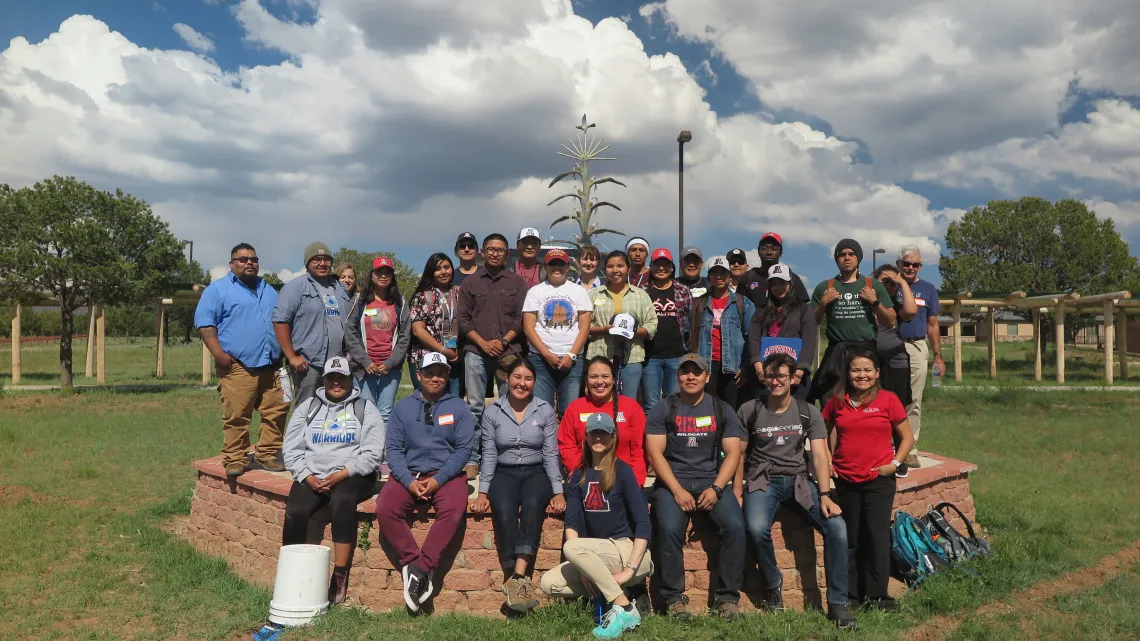Building Bridges: Diné College and UArizona support students in STEAM

In partnership with Diné College, the University of Arizona established the “Advancing Postsecondary Attainment and Research in STEAM for Tribal Students” program in fall 2021. The program is dubbed “Bridge to STEAM” and works to provide Native American undergraduate students with a clear and culturally responsive pathway for transfer to UArizona. Indige-FEWSS Trainees Mark Clytus and Christopher Yazzie participate in establishing the program’s bridge to STEAM (science, technology, engineering, agriculture, and mathematics) as mentors to Diné College undergraduates.
“Strengthening partnerships through authentic and sustainable relationship-building with Diné College is critical to facilitating every pathway possible to support Native American students with a welcoming and inclusive transfer experience. The goal is to create an environment at UArizona for Native American students that offers continued support from student allies and staff alike. It is important to engage students by demonstrating how a STEAM degree can serve the needs that they identify within their communities,” said Jennifer Fields, Director of the Office of Societal Impact and senior personnel on the project.
Both land-grant institutions, UArizona and Diné College were awarded the New Beginnings grant of $284,096 by the U.S. Department of Agriculture's National Institute of Food and Agriculture (USDA-NIFA) to support the academic success of tribal students. The project's long-term goals are to produce established relationships with Diné College and other land-grant tribal colleges and universities (TCUs) while promoting the academic success of Native American students in STEAM fields through mentoring and a community support system.
As mentors on the project, Clytus and Yazzie aim to foster the growth and success of the Diné College scholars. Mentor-scholar meetings occur bi-monthly with emphases on education, research, career goals, work-life balance, and relationship building. UArizona mentors and Diné College scholars will also work to develop relationships with other Diné College students, Navajo Nation community members, and high school students through outreach activities that integrate STEAM education and cultural relevance.
Speaking on his experiences as a mentor, Mark Clytus said, “We are preparing and empowering future Indigenous/Native American STEAM scholars for the professional community [with an emphasis on] diversity and culturally relevant knowledge in STEAM.”
Dr. Demetra Skaltsas, Co-Principal Investigator and STEM faculty at Diné College, oversees the scholars from Diné College as their research advisor. Their current research project explores genomics and mycology. With assistance from Dr. Skaltsas and mentors, the scholars are building research skills and confidence that will support them in taking the next education or career step.
Dr. Skaltsas said, “We are pursuing a line of investigation that resonates with the students’ desire to give back to their communities while advancing their knowledge. Through hard work and dedication, these Scholars are quickly mastering the skills needed to be resourceful scientists.”
"I get to be a part of novel research within a tribal nation with tribal mentors. The program has helped me gain more experience on how research is done before and after a paper is published. The knowledge that I gain here will help guide my goal of publishing my own research. If you have the opportunity to be a part of the Bridge to STEAM program, I would say go for it because it is worth it” said Darrell Yazzie, Jr., Diné College biology major and scholar in the program.
With the success of the first cohort, the program looks forward to recruiting the 2021-22 cohort of STEAM scholars and mentors. By providing a culturally-responsive pathway for Native American transfer students, the program’s vision is to continue building sustainable relationships with Diné College and building a community for indigenous students in STEAM.
For more information, please contact one of the co-investigators: Karen Francis-Begay, PI, at kfbegay@arizona.edu, Demetra Skaltsas, co-PI, at dnskaltsas@dinecollege.edu, Kimberly Sierra-Cajas at kjsc@arizona.edu, or Benita Litson at blitson@dinecollege.edu.
